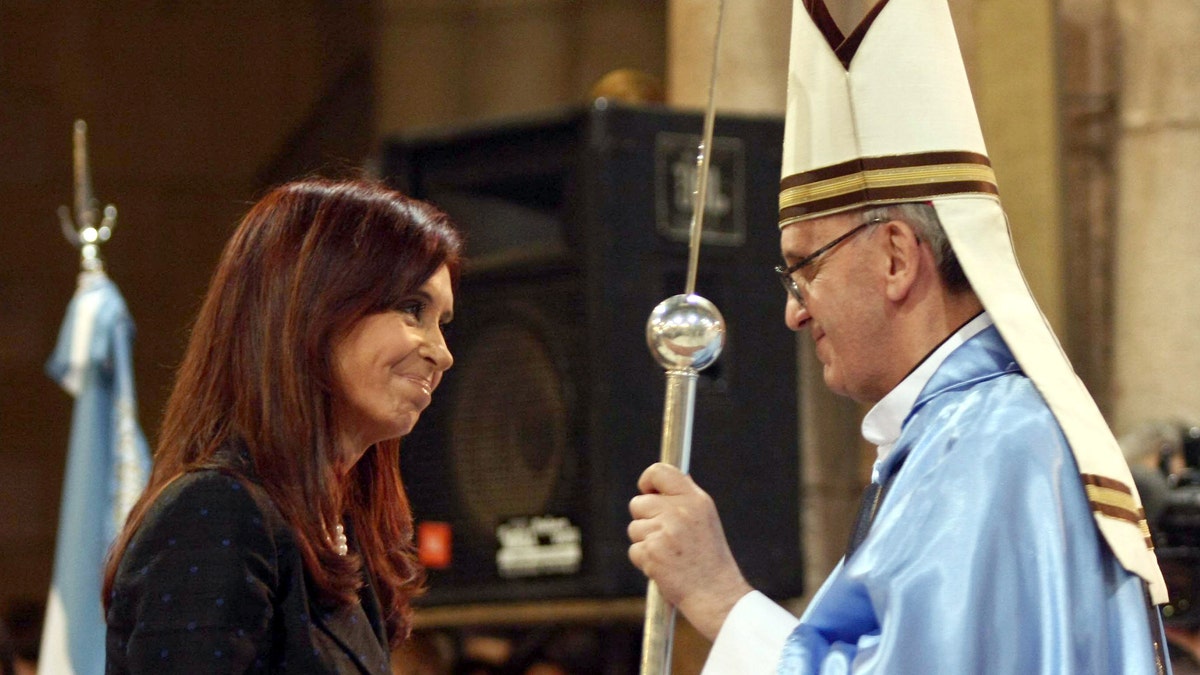
FILE - In this Dec. 12, 2008 file photo, Argentina's President Cristina Fernandez, left, shakes hands with Buenos Aires' archbishop Jorge Mario Bergoglio in Lujan, Argentina.
In such a politically polarized country as Argentina today, there are only two options — K or anti-K (pro-Kirchner or anti-Kirchner). No room for any middle ground. So mighty is this polarization vacuum cleaner that its suction power could reach Rome in a bid to freeze-frame the new Holy Father as an adherent of the 1976-83 military dictatorship — no less.
One of the many marvels of Argentina: ignominy as an export.
This is not the time to insist on K polarization for export, nor to sin of omission — the big omission being the reconciliation claimed by the 70 percent of the Argentinean population which considers itself Catholic.
This is not exactly a matter of faith. The main driving force behind the thesis that Jorge Bergoglio was an accomplice of the military regime is journalist and Casa Rosada advisor Horacio Verbitsky, who in 2005 published a book -El Silencio: de Paulo VI a Bergoglio: las relaciones secretas de la Iglesia con la ESMA- to press the case.
Strangely enough, 2005 was also the year in which then President Néstor Kirchner broke with the Argentine Church hierarchy. And how could he not? The sermons and public stances of then Buenos Aires archbishop and today Pope Francis were not exactly making him patron saint. Not surprisingly, that year the Kirchners stopped attending the traditional Te Deum in order to escape the admonitions of Bergoglio.
Last week, Nobel Peace Prize winner Adolfo Pérez Esquivel was quick to deny any complicity of Bergoglio with the junta dictatorship. "Bergoglio was questioned for not doing enough as Jesuit superior to get two priests out of jail, but I personally know for a fact that many bishops interceded with the military junta for the release of prisoners and priests to no avail," the Nobel Prize winner recalled.
- Francis I, The Pope that Came From the South
- Jorge Bergoglio’s Elevation to Pope Has Argentineans at the Vatican Celebrating
- Pope Francis Meets Press for First Time
- New Pope’s Name, Latin and Jesuit Roots Hint At How He Will Serve
- Pope Francis, One Lung? No Problem
- Pope Francis Delights Again by Meeting the Crowd Before First Window Appearance
- Meet Pope Francis, First South American Pontiff
Whether another coincidence or not, 2005 also saw the death of Pope John Paul II and the election of Joseph Ratzinger in the Petrine succession, with Bergoglio widely named as very much in the running in that race.
Two big guns joined the Kirchners’ attack against the now pope — Mothers of Plaza de Mayo leader Hebe de Bonafini and picket leader Luis D’Elia, also a parallel foreign minister pioneering the relations with Iran.
This anti-Bergoglio Trinity was not in a quest for any doctrinal re-interpretation of the faith but for far more earthly results: give the Cardinal Primate of Argentina a blast of the political polarization in order to drive him into opposition trenches.
The fact that two visible opposition leaders (Elisa Carrió and Gabriela Michetti) frequented the Archbishop’s confessional surely contributed to the conspiratorial reasoning.
Shoved into a trench by the political infighting, Cardinal Bergoglio then started showing his opposition teeth, with pronouncements against legislation favoring abortion, gay marriage and euthanasia — all answered with the cheap shots of the moment.
The memory of the anti-Bergoglio Trinity returned with a vengeance last week, the moment that the Argentine’s elevation to the papacy became known. "Francis is to Latin America what John Paul II was to the Soviet Union, a new attempt by the empire to destroy South American unity," tweeted pro-Iran picket leader Luis D’Elía.
In other words, this Casa Rosada habitué seems to believe the Pope lies at the heart of an international conspiracy.
Not wanting to be left behind, Hebe de Bonafini gave her own theological classes, saying the Mothers of Plaza de Mayo have maintained contacts "only with Third World priests ... since we started our struggle." The official Church is oppressive but Third World priests are a liberating force, she explained. She could not have spelled it out more clearly — in Bonafini’s eyes, this Pope is an oppressor.
The funny thing about all this is the silence. And here we are not referring to the title of the book seeking to link Pope Francis to the military dictatorship. The odd thing is the silence of the Casa Rosada in the face of these rumors striving to smear the man elected in the Vatican conclave, among other reasons because he was found to be completely clean of all the dirty linen aired by the so-called Vatileaks.
Bergoglio is now in Rome as the head of 1.2 billion people. From an enemy soldier in the local trenches he has passed to represent a global power. This is not the time to insist on K polarization for export, nor to sin of omission — the big omission being the reconciliation claimed by the 70 percent of the Argentinean population which considers itself Catholic.
